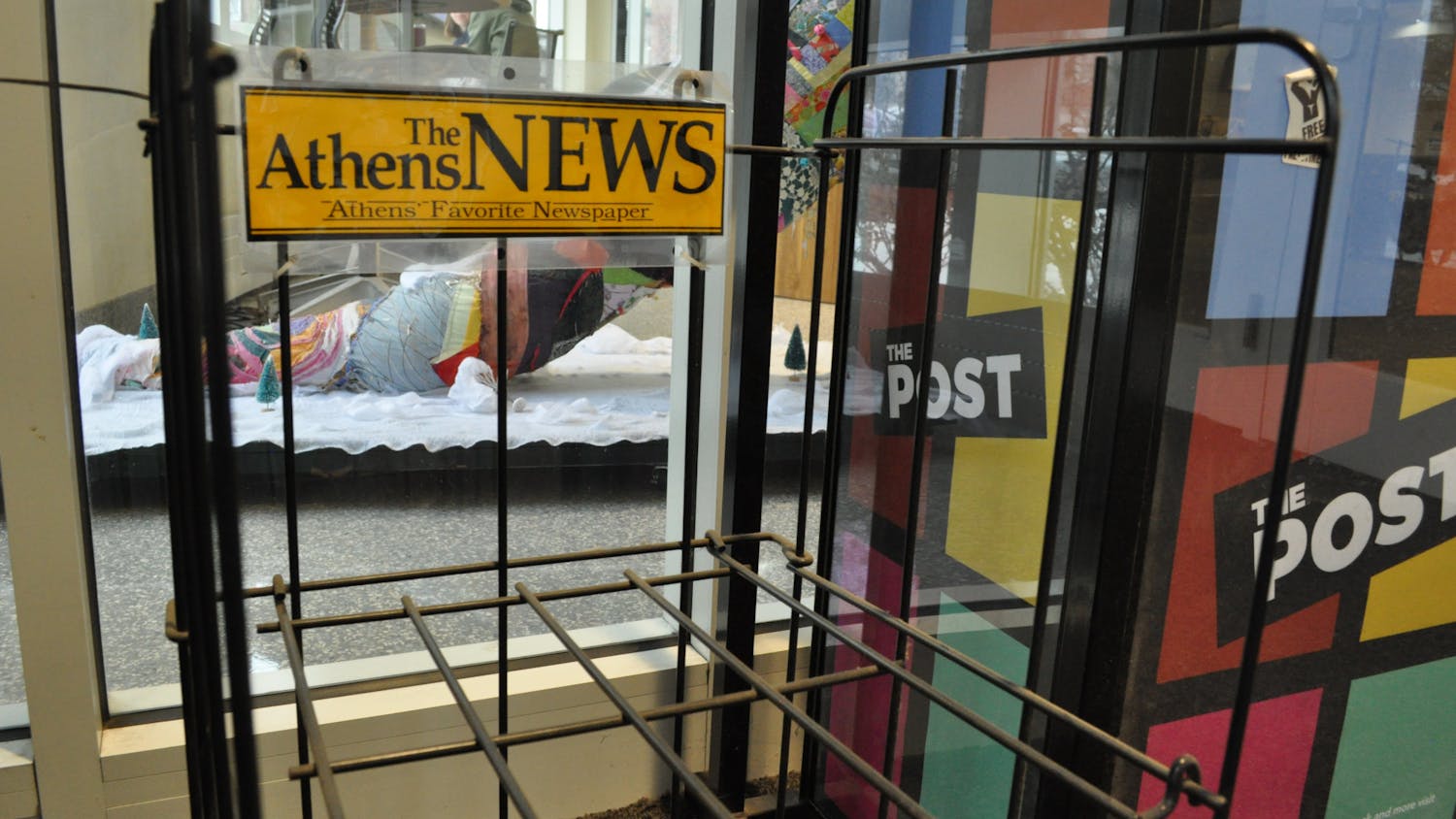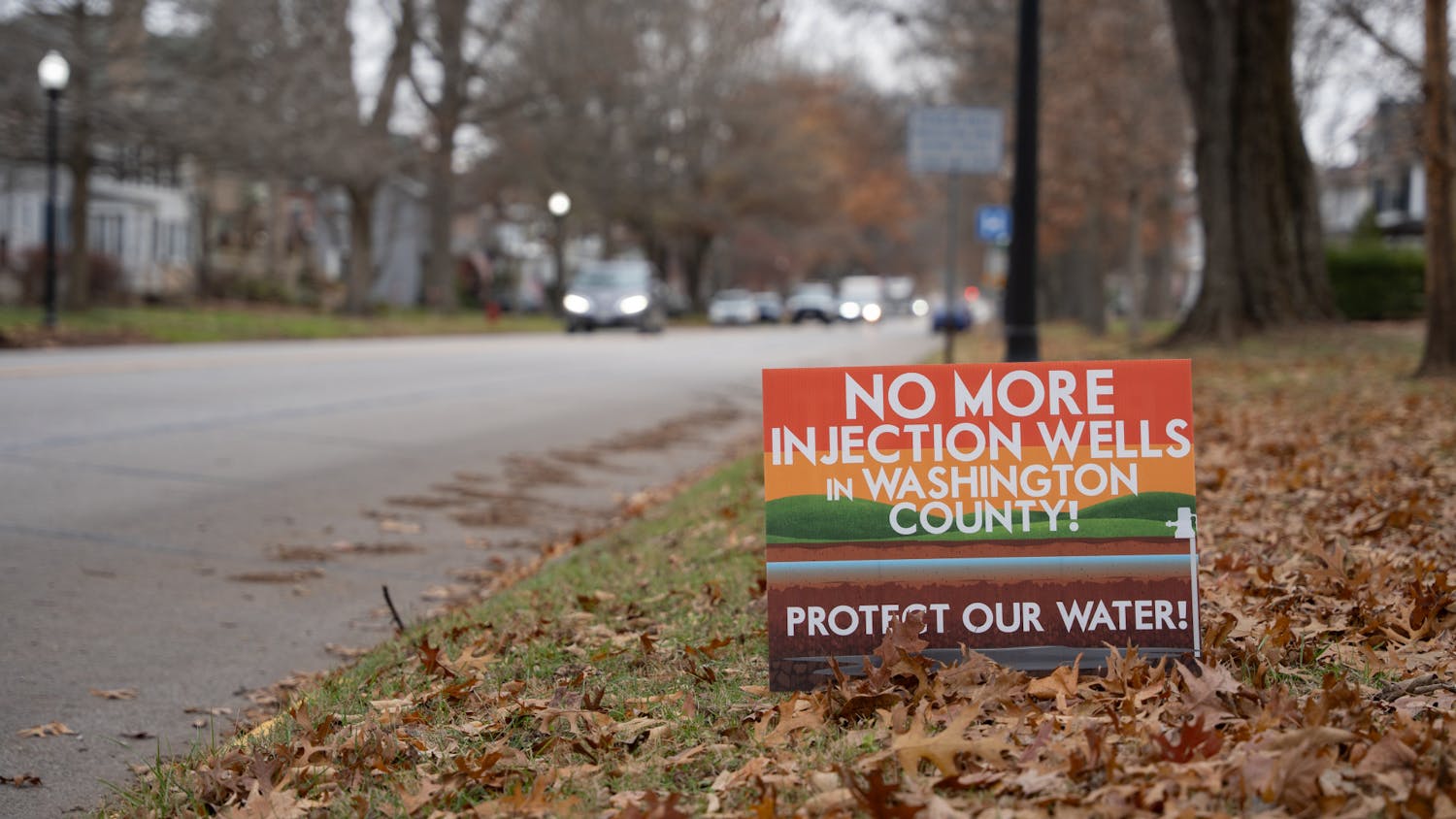Athens Mayor Paul Wiehl speaks with The Post in an open-ended interview.
You know what Paul Wiehl’s office looks like.
Many Athens residents and Ohio University students have never seen the mayor’s office space, but it’s just the set up you might think a small town mayor would have.
There is a desk, chair and computer against one wall.
Binders, books and office decorations, including a framed Chinese opera performer and an Ohio State flag. Between the walls are four chairs circling a small, round table.
As simplistic as his office is, the man in charge of Ohio’s Appalachian epicenter is a rather quirky guy who came to Athens from America’s ultimate metropolis, his hometown of New York City.
Athens' head of government, who as mayor once compared his salary to the grocer price for a pound of bananas, was sharp, firm in his resolve to lead the city and full of analogies to make his points clear when he sat down with me for a one-on-one interview Tuesday at City Hall.
“I used to use turnips,” the mayor said of his dollar-to-commodity analogy from a 2010 interview on CNBC. The mayor said on live television: “I get $72,000 as a mayor. I break it down to minutes and I get about 58 cents per minute at that point. And then it comes down to what I buy in the grocery store. Bananas are 59 cents … am I worth that?”
Wiehl was born in Queens and raised on Long Island. He earned his bachelors of science from Marietta College in 1979 and moved to Athens in 1981 to take a lab tech job at OU. He served two terms on Athens City Council before being elected mayor in 2007. He’s in the middle of his second term following a decisive re-election in 2011.
Now, mulling over the option of a third term, the mayor says he still has a few things left on his plate before turning over the city’s reins.
In a wide-scope interview, the mayor talked city politics, from his legacy to his self-described pitfalls, as well as some of the biggest news at OU right now, such as Student Senate President Megan Marzec’s “blood” bucket challenge.
“I don’t think she’s disrupting the peace,” Wiehl said. “I think the biggest worry I’m hearing is Student Senate will not accomplish a lot because they’re in knots on this. You realize, in the city, we spend some time on fracking because it will affect us. We do not spend a lot of time on whether Russians should be in Ukraine because we’ve got enough things on our plate.”
A truncated — edited for clarity and space in print — version of the interview is printed below. For a longer version, please visit thepostathens.com.
First, before I asked the mayor any questions about city government, I asked him what he’d put on the front page of a newspaper if he had the choice.
PW: That’s a hard one to say, because really front pages are supposed to push the paper more than anything else. I guess I probably would look into — and it probably wouldn’t increase your circulation — how government functions and how things function. The reason why I got involved in government? Because I didn’t know how it worked. So, the idea there is most people don’t care how it works or even look at how it works, provided it does what they think it should do. The fact is, you turn on the water, how’s the water done? Where’s it come from? Where’s it go? I mean, we’re putting $18 million in renovations toward the waste-water treatment plant. That’s a major amount of money. And we don’t talk about it that much — it’s not glamorous, it’s sewage. Government 101, really.
JJ: So, when I told students I was meeting with you today, you know, a lot of them couldn’t even think of a question. And one student, mid asking a question, stopped and asked me: ‘The mayor’s a guy, right?’ So, do you think if students were more involved in city happenings it would make for a more productive conversation? Would it make your job easier in some ways?
PW: I think it would raise the level of discourse and expectations of what’s needed to make government happen. So it’s the awareness of it. There’s a lot (of students) who recognize me on the street. There’s a lot who don’t, you now, because there’s always a turnover. It’s not just a black box or something mysterious like a phone. I can’t assemble a phone, you can’t assemble a phone. But at the same time, you have a concept of how it works — it goes from here, it goes to the cell tower, it goes all over the place. Same thing with the government.
JJ: Would you say you’re well known for your analogies?
PW: No, I don’t think so.
JJ: On CNBC a few years ago, you compared your salary to —
PW: — Oh, yeah. Bananas.
JJ: Yeah.
PW: Well, the idea was to create context. I don’t have a concept of a billion dollars. What do I see a billion of? Maybe a billion grains of sand on the beach. How do you formulate something like that? I used to use turnips, basically, when I was in high school. But since I don’t eat turnips I don’t keep track of the prices of turnips. I’m sure it’s lower than bananas.
JJ: What’s the, I was just looking around your office, what’s the masked figure you’ve got up there?
PW: That’s a gift from an organization that came through. It was a group of Chinese, educational administrators. They wanted a meet-and-greet. Actually, in many cultures, an exchange of a gift is good. I’ve actually tasked my administration assistants to say, you know, we should think about that. So that was a gift. Actually, what’s crazy, I looked at it and I think the thing says on its side — it came in this box right here — “Chinese Opera Facial Make Up.” And I said, ‘Oh my God it’s a bunch of make up to put on,’ you know what I mean? But no, it was a framed mask. And I wouldn’t think that’s worth putting in the newspaper just because it probably shows my ignorance of other cultures in general.
JJ: Shifting gears toward current city issues, last night, the law director pretty much clarified some technicalities on what the city wants to do with the nuisance party ordinance. What did you think, and how do you see the city moving forward?
PW: Really, it’s trying to give somebody a citation without putting a criminal stigma on that.
JJ: But also trying to make more money of it.
PW: Well, I don’t know. Well, $250 would make more money off it. I don’t actually think it’s a matter of increasing revenue. It’s the ability to actually cite someone quicker. I’m not sure what council was thinking except for the fact that they were looking to say, OK, we’re going to make it harsher, to crack it down. And make a more specific citation process.
JJ: So it’s more of a deterrent than it is for revenue reasons?
PW: I can understand the philosophy of that.
JJ: Another issue I wanted to talk to you about was beer and wine at OU stadiums. How did you feel about that?
PW: It doesn’t impact the city, I don’t think.
JJ: A third thing, Bobcat Lane is set to do a trial run. I know you in the past were not a proponent of opening the road. Wondering what made you kind of shift gears, if you had at all.
PW: Well, I’m not really a proponent of it, but a couple of things happened there. One is that the GoBus has moved from The Convo down to Baker Center. I’m a big proponent of public transit. That was one aspect. Rather than just sit in my certitude that I am right about Bobcat Lane, even though I think I am, the scientist in me says let’s do an experiment.
JJ: Shifting gears to closing questions. There’s no term limit for you, right?
PW: No, there’s not. I haven’t made up my mind yet. Basically, I won’t have to make a decision until February when petitions have to be filled out.
JJ: If you don’t decide to run again, and these are your two terms, what do you think your legacy point, if you could pick just one, would be? Or what would you want it to be? If people were to say, ‘Oh, yeah, Mayor Wiehl, we really got X done under that guy.’ And what do you think was one misstep, or pitfall, of your tenure?
PW: Let me just stick on the positive one. Probably if anything, I’d look at public transit. I really shouldn’t take credit for this. The idea as mayor is you orchestrate it. You know, we’ve added bike lanes. We’ve improved the bus system. That, to me, is one of the better parts. And we’ve done some major infrastructure improvements, but again, to take credit for that is really not correct. For me to say ‘I did it all’ is not correct. The pitfalls? I don’t know. I would have liked to see improved recycling over time, but that’s a hard one to do. And the general environment, the economy in general. But most of those factors are outside our control. I did not come up with a theory for how to fix everything, and that’s I guess the frustrating part of it. And again, I still have lots of things on my plate to do.
Joshua Jamerson is a senior studying journalism, senior editor at The Post and writes a weekly column for The Post’s news pages.






